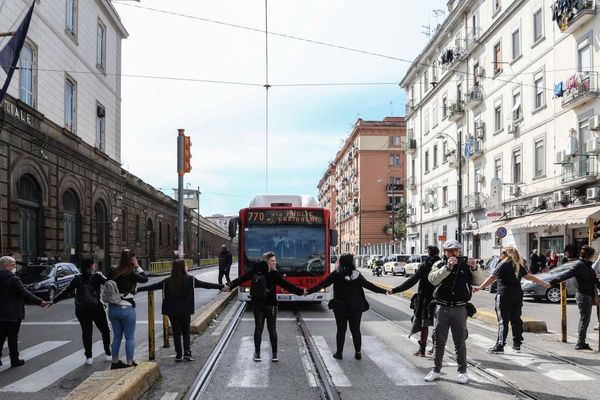
In a trendy exposed-brick studio – fake bookcases, a backless chair with comfy cushions, a printed backdrop of the glittering Denver skyline behind it – Hugh Hewitt experienced a rare moment of near-exasperation on Tuesday.
He was watching CNN, on which he was to imminently appear, as the network’s anchor Don Lemon teased an interview with the American conservative’s interviewer of choice: “Coming up, the man who stumped Trump.”
“I did not stump Trump,” the man muttered.
Hewitt is now the most influential conservative journalist in Republican presidential politics, the thinking candidate’s Rush Limbaugh and the brain to Matt Drudge’s secretive brawn.
A Richard Nixon protégé who served for six years in the Reagan administration, the 59-year-old presents a syndicated radio show, broadcast on nearly 100 stations from Los Angeles and Phoenix to Denver and DC, that has become the destination for Republican politicians seeking a fair hearing.
The expositions are not, as both Donald Trump and Hugh Hewitt discovered with the foreign-policy pop quiz heard ’round the world, easy.
Since last month’s first of 12 debates scheduled by the party and its now merely 16 candidates for president of the United States, Hewitt has quizzed every one of them, in nearly 40 confrontations.
Hewitt will appear on CNN again this Wednesday, as co-host of the second Republican primary debate with the network’s Jake Tapper. His responsibility will be to ask difficult questions, which partly explains why Hewitt remains mildly frustrated that his counterparts in the media have concentrated on accusations of “gotcha” journalism leveled at him by the man currently leading the primary field.
On 3 September, hours after Trump signed a pledge promising to run as a Republican or not at all, his interview on Hewitt’s show took a difficult turn: Trump said the difference between Hezbollah and Hamas would matter to him “when it’s appropriate”, after mistaking “Quds”, the Iranian special forces brigade, for “Kurds”. The candidate was rattled, insisting people like Qassem Soleimani – who has run the Quds force since 1998 – would “all be gone” by the time he reached the Oval Office anyhow.
“That is a gotcha question, though,” Trump told Hewitt. “I mean, you know, when you’re asking me about who’s running this, this this, that’s not, that is not.”
Later, Trump took to MSNBC to call Hewitt a “third-rate radio announcer”. The rightwing news site Breitbart called him “establishment”. Fox News contributor Geraldo Rivera said his questions had indeed been of the “gotcha” variety.
Hewitt didn’t mind a bit.
During a series of interviews over two days last week inside his temporary studio in Lakewood, Colorado, where he has been teaching at Colorado Christian University, Hewitt told the Guardian that of the roughly 25,000 interviews he had conducted in his 15-year radio career, he could count the ones that had escalated to “angry” on a single hand.
Trump, Hewitt said with a generous glimmer, is “the best interview in America”.
He denied that he was bothered by the process of receiving his “Trump tattoo”; the candidate’s mistake, he said, was simply a matter of mishearing. As for the blowback from inside the rightwing media: “Breitbart does not bother me in the least. Geraldo calling me a gotcha journalist, that does not bother me in the least.”
What does it mean to be a conservative talk-radio influencer in the age of Trump? Those better known to liberals than Hewitt are bombastic personalities – Limbaugh, Glenn Beck, Sean Hannity. Has their influence, on and off Fox News, led candidates on the right to mirror them? Did Fox and its friends beget the Donald show?
When asked gotcha questions of himself, Hewitt defers to history without being totally demure.
“Teddy Roosevelt turned politics into entertainment,” said the interviewer, not quite winking from behind his thick black glasses.
‘It’s not about us’
To his guests and their operatives, the Hewitt gauntlet is a welcome reprieve from the noise of nonstop campaigning – Trump and three other candidates shared space at a football tailgate on Saturday – and a chance to actually look in the mirror, when Trump is conducting fake interviews with himself in the mirror on the Tonight Show.
John Weaver, a longtime political consultant who helped run presidential campaigns for John McCain and Jon Huntsman and now works as senior strategist for Ohio governor and surging Republican candidate John Kasich, put Hewitt one notch higher, saying that “in the hierarchy of conservative thought-leaders, he is a grown-up”.
“He’s easy to work with, but that doesn’t mean he doesn’t ask tough questions, insightful questions, to put you on the spot,” Weaver told the Guardian. “Those are the kind of questions he asks in all his interviews.”
However, the Trump foreign policy debacle has led Hewitt to rethink his approach. He said that in his questions at the Reagan library on Wednesday he now planned to “state who the person is – don’t make anyone guess”.
Hewitt is planning to avoid long, involved questions for Trump and anybody else. “In the first debate, the moderators spoke for 34 minutes – that’s too much time,” he told the Guardian. “My ideal is nobody’s talking about me on Thursday.”

“I don’t want to tip my hand with any questions that … they can read and then get ready for,” he said. “But what I have made a habit of doing with everyone is asking: what will you do about Iran? What are you going to do about Libya, which is becoming as bad as Syria? What I want to do is ask questions that will allow the candidates to talk to each other.”
CNN had made an editorial decision, he said, to not “step on” actual debate itself, with which Hewitt agrees. “It’s not about us,” he said.
‘I’m a Nixonian’
Hewitt was born in Warren, Ohio, to a mixed Catholic-Presbyterian family. He still holds that dual faith, attending Roman Catholic mass on Saturday nights, then evangelical Protestant church on Sundays.
(Despite his devout faith, he was a close friend of the late atheist polemicist and author Christopher Hitchens, who appeared on Hewitt’s show 70 times. “He loved the conversation,” Hewitt said.)
He attended John F Kennedy Catholic school – whose other luminous alumni include Fox News chief Roger Ailes and Foo Fighters frontman Dave Grohl – then went to Harvard, where Doris Kearns Goodwin was his first professor.
Hewitt’s roommates in Cambridge during the Gerald Ford administration were Mark Gearan, who later became Bill Clinton’s deputy chief of staff, and Daniel Poneman, who would later serve as Barack Obama’s deputy energy secretary. They remain his close friends today.
“My friends have always been wrong,” he said of their Democratic leanings, “but I love them.”

After Harvard, Hewitt took a job with David Eisenhower working on a book about David’s grandfather, the former president, before getting a call from David’s father-in-law: Nixon, the most recent former president.
The young Republican drove cross-country in his Dodge Dart to Nixon’s estate in Monarch Bay, California, site of the David Frost interrogation, where he worked closely for more than two years as editorial assistant to his “great mentor”.
“That’s why I’m an internationalist,” Hewitt said. “Because I’m a Nixonian.”
After attending the University of Michigan Law School, he moved to Washington to clerk on the DC circuit court, then entered the Reagan administration – thanks, Hewitt suspects, to a recommendation from Nixon himself.
Five years later, following stints in the White House Counsel’s office, Hewitt returned to California to direct the construction of Nixon’s presidential library in Yorba Linda. “You don’t say no to the guy who made your bones,” he said.
It was back west where he started broadcasting, when a producer from a local station who had listened to the presidential ghostwriter and legal whisperer at press conferences decided he “had radio pipes”.
When a foray into TV with PBS didn’t stick, the Salem Radio Network asked Hewitt if he wanted his own syndicated daily radio show.
Soon enough, he was broadcasting live on the morning of 9/11.
He recalled striving to “to try not to panic people, but to relay the news”.
He also recalled misreporting the number of dead in New York.
‘An interviewer, not a monologuist’
Hewitt has spent part of the summer teaching undergraduates to read Winston Churchill, leading a seminar billed as training young Americans “to do your part in keeping our country great”. In this, it matches Trump’s slogan of “Make America Great Again!”, which echoes Reagan word for word.
His temporary Colorado studio overlooks a vast domed new-age church, which looks like someone sank the Death Star two-thirds into the earth, except that it gleams whiter than a Kennedy’s tooth. In this, it matches Hewitt’s hair.
His professorial manner is immediately belied by his voice, loud and authoritative, which slices the air even more in person.
Yet Hewitt distinguishes himself from louder drive-time influence jockeys like Limbaugh or Beck: without naming either competitor directly, he refers to himself as “an interviewer, not a monologuist”.
“The point about talk radio that many people don’t understand: they think it’s just screaming, yelling, emotional, when in fact I believe it’s educational, informative and persuasive if done well,” he said between recording sessions.
His interview manner is just shy of prosecutorial: unhurried but pressing, and peppered with legal knowledge. His conversations, on air and off, include book recommendations across the political spectrum. He loves fantasy fiction, too: he has read all of George RR Martin’s A Song of Ice and Fire – the Game of Thrones theme is currently his show’s introductory music – and is currently listening to an audiobook of the less well known Wheel of Time series.
Hewitt said he had only been nervous in his career two times.
The first was leading up to an appearance on Stephen Colbert’s show because, he said: “Who knows what’s going to happen?” He said Colbert, even before ditching his bombastic conservative persona to replace David Letterman last week, was an “incredibly generous” interviewer.
The other time Hugh Hewitt felt fear was before interviewing not a politician but an entertainer: Julie Andrews. “That scared the living daylights out of me,” he said. “It’s Mary Poppins.”
Trump and the primetime presidential debate will not make three.







